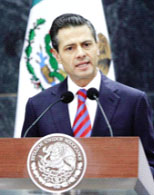CULIACAN, Mexico/ WASHINGTON, (Reuters) – Efforts to combat illegal gunrunning from the United States to Mexico have stumbled in recent years amid a lack of cooperation between officials on both sides, according to a report released yesterday by a U.S. federal watchdog agency.
The report from the Government Accountability Office (GAO), finalized after the latest arrest of Mexican drug lord Joaquin “El Chapo” Guzman and seen by Reuters ahead of the official release Monday, also criticized U.S. law enforcement agencies for not ensuring that agents work together effectively to fight arms smuggling by Mexico’s ruthless drug cartels.

Squabbling between U.S. authorities and Mexico over Guzman has put an intense focus on the issue of cooperation. Mexico, which refused to extradite him to the United States when he was arrested in 2014, was formally commencing extradition proceedings against Guzman after his latest capture.
“Efforts to stem firearms trafficking between the United States and Mexico were scaled back as the administration of Mexican President Enrique Pena Nieto reconsidered bilateral law enforcement cooperation,” said the document first reported by Reuters, which cites U.S. and Mexican officials.
Mexico tightly restricts gun sales, but the flow south of U.S. weapons helped fuel battles between drug gangs and security forces that have killed more than 100,000 people since 2007.
Experts say efforts to stem the flow of guns south have had little success, pointing to the botched “Fast and Furious” sting in which U.S. agents lost track of guns allowed to enter Mexico between 2009 and 2011.
The GAO report was commissioned by U.S. Representative Eliot Engel as a follow-up to a similar GAO study in 2009.
“Congress has a responsibility to do much more to stop the illegal flow of guns across the U.S.-Mexico border,” said Engel, a Democrat.
Calls to tighten U.S. gun laws have run into stiff opposition in Washington, largely from Republicans and despite high-profile mass shootings in the United States.
Pena Nieto dialed back cooperation with U.S. authorities after taking office in late 2012. U.S.-Mexico law enforcement ties, long undermined by mutual distrust, had improved under Pena Nieto’s predecessor, Felipe Calderon.
Upon taking office, Pena Nieto’s administration balked at the extent of U.S. involvement in Calderon’s war against drug gangs and his team limited U.S. law enforcement access.
The report said collaboration between the two countries has improved in the past year, but cited concerns about corruption among Mexican authorities. Pena Nieto replaced his attorney general last year with an official more open to working with the U.S. government than her predecessor.
Of nearly 105,000 guns seized in Mexico and submitted for tracing from 2009 to 2014, 70 percent came from the United States, according to data from the U.S. Bureau of Alcohol, Tobacco, Firearms and Explosives (ATF) cited in the study.
Another 17 percent were traced to other countries, while 13 percent could not be tracked, possibly as U.S. gun shops that closed down did not turn over records.
Available data showed a drop since 2011 in the number of weapons confiscated by security forces in Mexico and traced to the United States.
However, the GAO said that Pena Nieto’s government restricted law enforcement agents’ access to the ATF’s eTrace weapons-tracking software after taking office in 2012.
